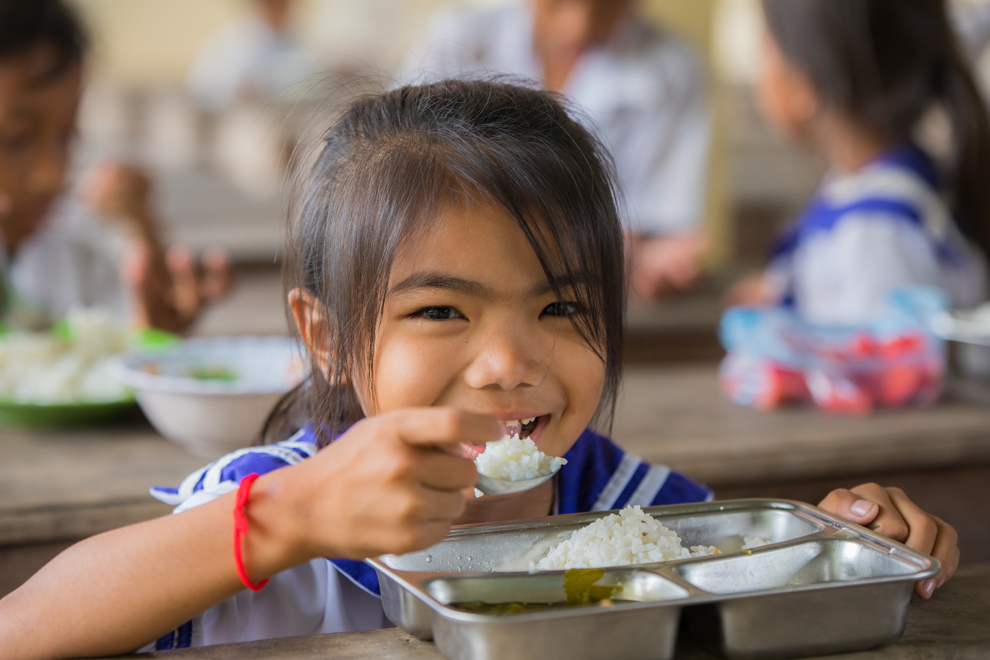
The Ministry of Education, Youth and Sport is to implement the World Food Programme initiative of feeding students in six provinces. Photo supplied
The Ministry of Education, Youth and Sport on Sunday announced its continued goal of implementing the World Food Programme (WFP) initiative of feeding young students in six target provinces for the academic year 2019-2020.
The ministry plans to spend seven billion riel to support the implementation of the feeding programme for 53,000 students in 205 schools across Battambang, Stung Treng, Preah Vihear, Banteay Meanchey, Kampong Cham and Siem Reap provinces.
The WFP said the feeding programme is to promote children’s wellbeing and increase their productivity in school.
Since its creation in 1999, more than 1,000 schools and 200,000 students have benefited from WFP meals and snacks.
Speaking before more than 300 participants from 70 countries, Minister of Education, Youth and Sport Hang Chuon Naron said last week at the 21st Annual Global Child Nutrition Forum in Siem Reap province that the government and its development partners recognise providing nutrition as a joint priority for the promotion of health, education and economic development in Cambodia.
“Investing in nutrition programmes at schools not only helps reduce poverty and promote nutrition, but also helps millions of children with achieving their dreams,” the minister said.
Having inspected the target schools last week, he said the programme offered opportunities for farmers from whom the programme’s agricultural produce are bought.
“We have gathered experience from the WFP and we’ll start training ministry, provincial, district and school officials to implement the programme.
“Having studied it, we saw that during implementation, the rate of students entering schools rose to 99 per cent from 80 per cent and the eight per cent dropout rate decreased to six per cent, while students who graduated or moved to the next school level rose from 79 per cent to 88 per cent,” the minister said.
The ministry said the school feeding programme for the 2018-2019 academic year had been implemented in 1,167 primary schools across eight provinces.
An estimated 260,000 children received breakfast, of whom some 8,000 received “food scholarships”. Another 50,000 children received breakfast made from the community’s agricultural produce.
Nheb Sayoeurn, the principal of Hun Sen Primary School in Angkor Thom district’s Svay Chek commune in Siem Reap province, said that since the feeding programme began, student attendance has shot up, along with an improvement in their grades and wellbeing.
“Eating breakfast helps satisfy their hunger. In turn, they can pay more attention in class. Providing food for students also reduces the expenses of their families because they don’t need to spend money to buy breakfast anymore,” Sayoeurn said.
Thong Chanthorn, the chairwoman of the Committee of Kok Kriel Primary School in Angkor Thom district’s Leang Dai commune, Siem Reap province, also raised the benefits of the programme.
“The food provided to the students consists of cooked rice and a one-course meal. But the cook changes the meal every day. We have vendors selling vegetables, fish and meat.
“The school asked the vendors to buy vegetables from the community and sell it in school,” Chanthorn said.
Den Hean, 48, a farmer in Leang Dai village in Angkor Thom district, said the programme helped improve his livelihood as it encouraged school representatives to purchase vegetables.
“Many farmers didn’t grow vegetables before. But now we grow them and our livelihoods have improved,” he said.














